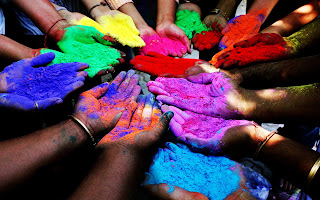Festivals
Diwali:
Diwali is one of the biggest festival of Hindus, celebrated with great
enthusiasm and happiness in India. The festival is celebrated for five
continuous days, where the third days is celebrated as the main Diwali
festival or 'Festival of lights'.
Tradition of Diwali Pooja:
The literal meaning of 'Diwali' in Sanskrit is 'a row of lamps'.
The most popular tradition of Diwali is filling little clay lamps with
oil and wick and lighting them in rows all over the house. On that day, all houses looks beautiful with the row of lamps.
Diwali Gift Tradition:
Diwali festival, the most celebrated festival in India, is also
associated as the largest gift giving.
The tradition of exchanging gifts and shopping is very popular during
Diwali. People go to their relatives and friend's houses to wish them and also give them sweets and gifts.
The Tradition of Lights:
The Diwali is the festival of lights. So, during the festival oil lamps burned throughout the day and night to ward off darkness and evil.
The Tradition of Fireworks:
Also acclaimed as the Festival of Lights, Diwali is associated with
lights, sweets, and liveliness; especially lights. As, it is celebrated
on the new-moon (Amavasya) night, lights and fireworks have a
significant role to play in this festival.The sky looks beautiful with multicolored and impressive fireworks
Holi:
Holi is also the famous festival of India. It is known as the festival of colors. On this day, people play with the colors. Holi is celebrated across the four corners of India. It is one of the oldest festival of india and many interesting stories are associated with it. The scene of holi festival is so beautiful to watch. People wear new clothes and they play with each other with colors. The whole atmosphere gets filled with the clouds of colors. People sing songs and make delicious food at home on this day.
Baisakhi:
Baisakhi is the festival of Sikhs and it is celebrated specially in Punjab but also in other countries across the world where Punjabi's live. It falls on April 13th or April 14th and marks the beginning of solar year. People visit Gurdwaras and thank god for good harvest. On that day in 1699, Sikh's tenth guru (Guru Gobind Singh Ji) organized the order of Khalsa.












